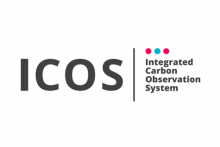
The Integrated Carbon Observation System (ICOS) is a distributed European Research Infrastructure (RI) operating standardized, high-precision, and long-term observations on greenhouse gases (GHG) budgets and their perturbations. The observations provided by ICOS RI are required to understand the present state and predict future behaviour of the global carbon cycle and GHG emissions. The operations of ICOS RI are coordinated by the legal entity ICOS ERIC, based in Helsinki, Finland. ICOS RI facilitates research, provides necessary information on greenhouse gases which supports policy- and decision-making to combat climate change and its impacts and promotes technological developments and implementations by the linking of research, education and innovation.
The backbones of ICOS RI are the national measurement stations such as ICOS atmospheric, ecosystem and ocean stations. Together they form national measurement networks. Each of the ICOS stations has a responsible Principle Investigator (PI) and together PIs form a Monitoring Station Assembly (MSA). MSAs are established for atmospheric, ecosystem and ocean networks to monitor, develop and improve the scientific and technical basis (e.g. station networks) of ICOS RI. ICOS Central Facilities, such as Atmospheric Thematic Centre, Ecosystem Thematic Centre, Ocean Thematic Centre, Central Analytical Laboratories, Carbon Portal and Head Office are the European level ICOS RI Centres, which have the specific tasks in collecting and processing the data and samples received from the national measurement networks.
ICOS aims to become the European pillar of a global observation system on carbon and GHGs and wants to cooperate with other regional observation systems. In this endeavour ICOS aims to support African countries to build related, however adapted observations systems. ICOS is an admitted observer organization of the United Nations Framework Convention of Climate Change (UNFCCC) and a participating organization in the Group on Earth Observation (GEO) and. ICOS has supported the GEO initiative on carbon and GHGs (GEO-C). Furthermore, ICOS is involved in the development of the Integrated Global Greenhouse Gas Information System (IG3IS) of the World Meteorological Organisation (WMO).
ICOS ERIC co-coordinates WP 7 Observations. ICOS ERIC represents the full competence of ICOS as a distributed research infrastructure, namely the Head Office, ICOS Carbon Portal, ICOS Ecosystem Thematic Centre , ICOS Atmosphere Thematic Centre and ICOS Central Radiocarbon Laboratory. ICOS Carbon Portal and Thematic Centres will provide established competence of the ICOS data life cycle that is connected through the unning cluster project ENVRI-FAIR to the services of the European Open Science Cloud.